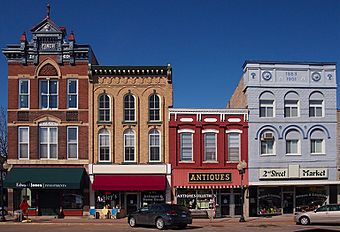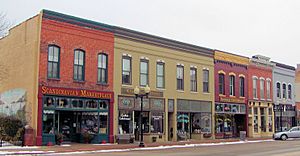East Second Street Commercial Historic District (Hastings, Minnesota) facts for kids
Quick facts for kids |
|
|
East Second Street Commercial Historic District
|
|

A block of several historic buildings in downtown Hastings
|
|
| Location | Hastings, Minnesota |
|---|---|
| NRHP reference No. | 78003070 |
| Added to NRHP | July 31, 1978 |
The East Second Street Commercial Historic District in Hastings, Minnesota, is a special part of the city's downtown. It's home to 35 old buildings that were built between 1860 and 1900. This area is unique because it has kept its historic look, even when many other towns updated their downtowns after World War II.
What is the East Second Street Historic District?
This historic district is like a time capsule. It shows what downtown Hastings looked like over a hundred years ago. The buildings here are important because they tell a story about the past. They remind us of how people lived and worked in the late 1800s.
What Makes These Buildings Special?
The buildings in the district are mostly two or three stories tall. Each one has its own unique style. Even though they look different, they share some cool features. Many have special tops called parapets at the roofline. A parapet is like a low wall that extends above the roof. Sometimes, the name of the old business is built right into the brick or metal of these parapets.
The ground floors of these buildings often have large display windows. These were perfect for showing off goods to people walking by. The main entrance is usually in the middle, with strong cast iron or wooden columns on either side. If you look up, you'll see that the windows on the upper floors often have fancy decorations above them. These are called "hoods" and they add to the building's unique look.
Keeping History Alive
It's important to keep these old buildings looking their best. The people in Hastings have rules to help with this. These rules encourage owners to restore buildings to how they first looked. If any old parts were changed over time, the rules suggest putting them back. This helps make sure that any new changes fit in with the original historic style of the buildings. This way, the district stays a special place for everyone to enjoy.
 | Percy Lavon Julian |
 | Katherine Johnson |
 | George Washington Carver |
 | Annie Easley |




